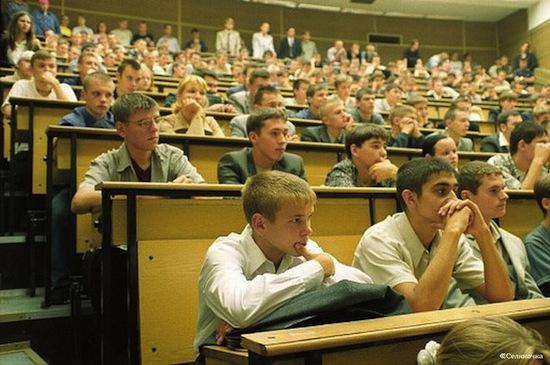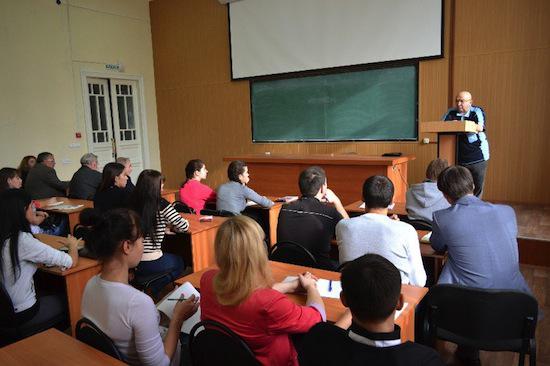896
7 ways that studying at university makes you dumber
How exciting and useful to study at university, getting a higher education, you have many times told. Today we present a selection of facts proving that over the five years spent on the study, you will not only learn a lot, but perhaps slightly poglupeete. So, scientifically tested seven ways in which study at the university makes you dumber:
1. Group myshlenie
University - an institution where the learning process is carried out in the team. Had neither the time nor the resources to teach each student individually, so that in the end are a group of 20-30 people. Often teachers split up the group to even more small parts, however, work in small groups does not make you smarter.
Researchers at the Research Institute in Virginia asked the students to pass IQ tests, first individually and then in groups of five. In the second case, the results were significantly worse. Apparently this happens because the social status plays a huge role in how the brain works, so that when people have to focus on their social role in the group, even if unconsciously, to focus on the main current task is not impossible. Researchers believe that in five years of study such behavior is fixed, and can manifest itself after the institute, for example, during business meetings.
2. The seat all den
Sitting in one place all day reduces mental capacity. Dr. James Levine of the Mayo Clinic conducted a series of tests to find out how long the seat affects on human health, and the results were disappointing.
The main objective was to understand how long the daily immobility affects weight gain, but it turned out that it affects the brain. Levine found that people who sit on the ground for more than two hours a day, significantly reduced metabolism - a factor directly related to cognitive abilities. Your brain uses glucose as fuel, occurring in the body due to the burning of calories. So a few hours of classes or night cramming before exams may lead to the fact that the brain begins to perceive the information is not as effective.
3. Multitasking
Surely quickly switch between current affairs tried everything. Intense training schedule will force any student to try to do several things at once, but in fact it is absolutely not conducive to progress. When you try to do several things at once, you will make each of them worse.
Those students who tend to be multi-tasking, open to new information, and a short time later it is difficult to remember. For example, when they were shown the letter sequence, they could not specify how often repeated the same letter. Often students are not able to determine whether a number is even or odd, or according to them a letter or vowel. Researchers believe that people who regularly multitask so weakened their ability to filter out irrelevant data, and now it is difficult to focus on one subject. So the next time you decide on a math lesson of sociology, can simply leave the audience - so you'll learn more as paradoxical as it sounds.
4. Beg
It does not matter whether you're running to relieve stress after a busy school day, or drive off a hangover the morning, running down the street - a great way to cheer up and increasingly popular hobby among young people. But for your studies jogging craze may be a hindrance.
Jogging in an urban environment or in any place where, in varying degrees, there is pollution, reduces your ability to absorb new information. Brussels University shared by the runners into two groups: one regular run in the city, others - out of town. It turned out that the urban runners reduced concentration and reaction. This is due to the high concentration of harmful substances in the blood after an hour of running. The solution will run on a windy day, or in the rain, when the city still gets cleaner.
5. Stress
Stress - is a normal part of university life. You are constantly in sight, your future depends on your assessment, and you often have to hide their actions. In such circumstances, to respond adequately to stressful situations becomes more and more difficult.
The stress Yale Center surveyed 100 people held in the past, through a strong stressful situations. The results showed that the more stressful experiences was, the more was perefronatlnaya cortex - the region of the brain responsible for impulse control and emotional stability. These abilities are important to our ability to learn from experience. Moreover, stress reduces the number of neurons in the brain, thereby reducing the ability of the brain to process and store new information.
6. Son
The need to constantly get up early or spend sleepless nights preparing for the lectures, also can make you stupid. At the University of Berkeley, we conducted on hamsters experience to know exactly how lack of sleep affects the mental ability. Hamsters sleep schedule changed every 6 days, and the resulting neural activity animals dropped by 50%. Some of them even could not find the wheel.
Hamsters showed a decline of mental abilities for a month after being returned to the normal daily routine. Thus, lack of sleep can have long-term consequences.
7. Lektsii
Statistics show that most of the time we spend at the University of listening to someone else's monologue. So we learn. But at the same time, this method of training lowers your ability to make sound decisions. 24 students answered questions about how they use this or that financial opportunity, take advantage of any good opportunity in certain circumstances. At the same time they do MRI brain. In some cases, the subjects received advice from the "experts" in some - no.
Most of the study participants received exactly as they were advised, even if it was a risk. And when any recommendations they have not, then take the risk into account and make their own decisions based on all the known data, and only then give an answer. According MRI brain activity in these cases was higher.
via factroom.ru
1. Group myshlenie

University - an institution where the learning process is carried out in the team. Had neither the time nor the resources to teach each student individually, so that in the end are a group of 20-30 people. Often teachers split up the group to even more small parts, however, work in small groups does not make you smarter.
Researchers at the Research Institute in Virginia asked the students to pass IQ tests, first individually and then in groups of five. In the second case, the results were significantly worse. Apparently this happens because the social status plays a huge role in how the brain works, so that when people have to focus on their social role in the group, even if unconsciously, to focus on the main current task is not impossible. Researchers believe that in five years of study such behavior is fixed, and can manifest itself after the institute, for example, during business meetings.
2. The seat all den

Sitting in one place all day reduces mental capacity. Dr. James Levine of the Mayo Clinic conducted a series of tests to find out how long the seat affects on human health, and the results were disappointing.
The main objective was to understand how long the daily immobility affects weight gain, but it turned out that it affects the brain. Levine found that people who sit on the ground for more than two hours a day, significantly reduced metabolism - a factor directly related to cognitive abilities. Your brain uses glucose as fuel, occurring in the body due to the burning of calories. So a few hours of classes or night cramming before exams may lead to the fact that the brain begins to perceive the information is not as effective.
3. Multitasking
Surely quickly switch between current affairs tried everything. Intense training schedule will force any student to try to do several things at once, but in fact it is absolutely not conducive to progress. When you try to do several things at once, you will make each of them worse.
Those students who tend to be multi-tasking, open to new information, and a short time later it is difficult to remember. For example, when they were shown the letter sequence, they could not specify how often repeated the same letter. Often students are not able to determine whether a number is even or odd, or according to them a letter or vowel. Researchers believe that people who regularly multitask so weakened their ability to filter out irrelevant data, and now it is difficult to focus on one subject. So the next time you decide on a math lesson of sociology, can simply leave the audience - so you'll learn more as paradoxical as it sounds.
4. Beg

It does not matter whether you're running to relieve stress after a busy school day, or drive off a hangover the morning, running down the street - a great way to cheer up and increasingly popular hobby among young people. But for your studies jogging craze may be a hindrance.
Jogging in an urban environment or in any place where, in varying degrees, there is pollution, reduces your ability to absorb new information. Brussels University shared by the runners into two groups: one regular run in the city, others - out of town. It turned out that the urban runners reduced concentration and reaction. This is due to the high concentration of harmful substances in the blood after an hour of running. The solution will run on a windy day, or in the rain, when the city still gets cleaner.
5. Stress

Stress - is a normal part of university life. You are constantly in sight, your future depends on your assessment, and you often have to hide their actions. In such circumstances, to respond adequately to stressful situations becomes more and more difficult.
The stress Yale Center surveyed 100 people held in the past, through a strong stressful situations. The results showed that the more stressful experiences was, the more was perefronatlnaya cortex - the region of the brain responsible for impulse control and emotional stability. These abilities are important to our ability to learn from experience. Moreover, stress reduces the number of neurons in the brain, thereby reducing the ability of the brain to process and store new information.
6. Son

The need to constantly get up early or spend sleepless nights preparing for the lectures, also can make you stupid. At the University of Berkeley, we conducted on hamsters experience to know exactly how lack of sleep affects the mental ability. Hamsters sleep schedule changed every 6 days, and the resulting neural activity animals dropped by 50%. Some of them even could not find the wheel.
Hamsters showed a decline of mental abilities for a month after being returned to the normal daily routine. Thus, lack of sleep can have long-term consequences.
7. Lektsii

Statistics show that most of the time we spend at the University of listening to someone else's monologue. So we learn. But at the same time, this method of training lowers your ability to make sound decisions. 24 students answered questions about how they use this or that financial opportunity, take advantage of any good opportunity in certain circumstances. At the same time they do MRI brain. In some cases, the subjects received advice from the "experts" in some - no.
Most of the study participants received exactly as they were advised, even if it was a risk. And when any recommendations they have not, then take the risk into account and make their own decisions based on all the known data, and only then give an answer. According MRI brain activity in these cases was higher.
via factroom.ru
Doctors conducting operations in the form of blue or green in order to be able to be distracted by the color of blood
Giving you become happier























